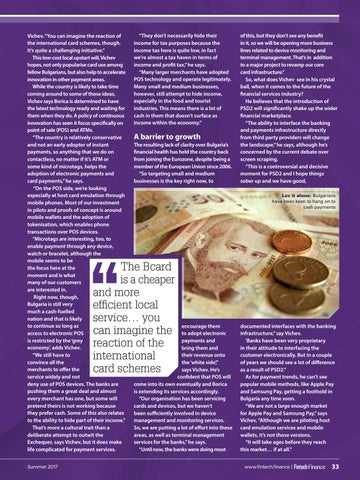Vichev. “You can imagine the reaction of the international card schemes, though. It’s quite a challenging initiative.” This low-cost local upstart will, Vichev hopes, not only popularise card use among fellow Bulgarians, but also help to accelerate innovation in other payment areas. While the country is likely to take time coming around to some of those ideas, Vichev says Borica is determined to have the latest technology ready and waiting for them when they do. A policy of continuous innovation has seen it focus specifically on point of sale (POS) and ATMs. “The country is relatively conservative and not an early adopter of instant payments, so anything that we do on contactless, no matter if it’s ATM or some kind of microtags, helps the adoption of electronic payments and card payments,” he says. “On the POS side, we’re looking especially at host card emulation through mobile phones. Most of our investment in pilots and proofs of concept is around mobile wallets and the adoption of tokenisation, which enables phone transactions over POS devices. “Microtags are interesting, too, to enable payment through any device, watch or bracelet, although the mobile seems to be the focus here at the moment and is what many of our customers are interested in. Right now, though, Bulgaria is still very much a cash-fuelled nation and that is likely to continue so long as access to electronic POS is restricted by the ‘grey economy’, adds Vichev. “We still have to convince all the merchants to offer the service widely and not deny use of POS devices. The banks are pushing them a great deal and almost every merchant has one, but some will pretend theirs is not working because they prefer cash. Some of this also relates to the ability to hide part of their income.” That’s more a cultural trait than a deliberate attempt to outwit the Exchequer, says Vichev, but it does make life complicated for payment services.
“They don’t necessarily hide their income for tax purposes because the income tax here is quite low, in fact we’re almost a tax haven in terms of income and profit tax,” he says. “Many larger merchants have adopted POS technology and operate legitimately. Many small and medium businesses, however, still attempt to hide income, especially in the food and tourist industries. This means there is a lot of cash in them that doesn’t surface as income within the economy.”
A barrier to growth The resulting lack of clarity over Bulgaria’s financial health has held the country back from joining the Eurozone, despite being a member of the European Union since 2006. “So targeting small and medium businesses is the key right now, to
Lev it alone: Bulgarians have been keen to hang on to cash payments
The Bcard is a cheaper and more efficient local service… you can imagine the reaction of the international card schemes
Summer 2017
of this, but they don’t see any benefit in it, so we will be opening more business lines related to device monitoring and terminal management. That’s in addition to a major project to revamp our core card infrastructure.” So, what does Vichev see in his crystal ball, when it comes to the future of the financial services industry? He believes that the introduction of PSD2 will significantly shake up the wider financial marketplace. “The ability to interface the banking and payments infrastructure directly from third party providers will change the landscape,” he says, although he’s concerned by the current debate over screen scraping. “This is a controversial and decisive moment for PSD2 and I hope things sober up and we have good,
encourage them to adopt electronic payments and bring them and their revenue onto the ‘white side’,” says Vichev. He’s confident that POS will come into its own eventually and Borica is extending its services accordingly. “Our organisation has been servicing cards and devices, but we haven’t been sufficiently involved in device management and monitoring services. So, we are putting a lot of effort into these areas, as well as terminal management services for the banks,” he says. “Until now, the banks were doing most
documented interfaces with the banking infrastructure,” say Vichev. ‘Banks have been very proprietary in their attitude to interfacing the customer electronically. But in a couple of years we should see a lot of difference as a result of PSD2.” As for payment trends, he can’t see popular mobile methods, like Apple Pay and Samsung Pay, getting a foothold in Bulgaria any time soon. “We are not a large enough market for Apple Pay and Samsung Pay,” says Vichev, ”Although we are piloting host card emulation services and mobile wallets, it’s not those versions. “It will take ages before they reach this market… if at all.” www.fintech.finance |
33
